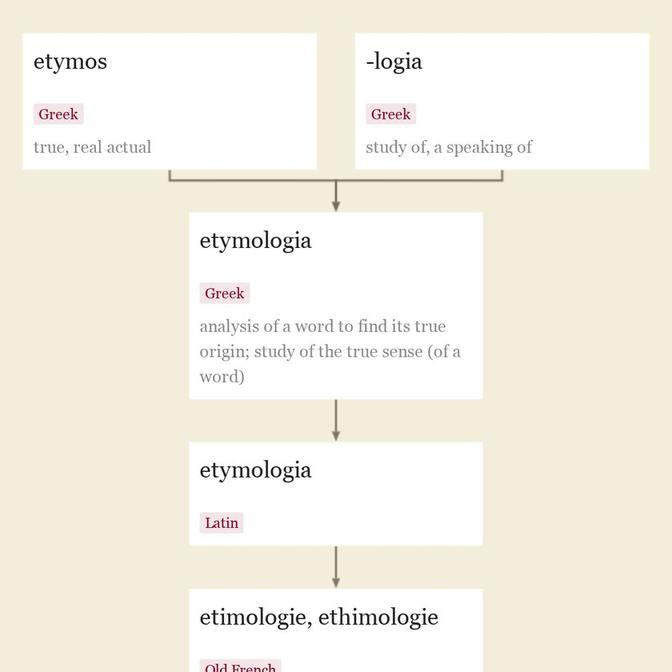Entries linking to etymologist
late 14c., ethimolegia "facts of the origin and development of a word," from Old French etimologie, ethimologie (14c., Modern French étymologie), from Latin etymologia, from Greek etymologia "analysis of a word to find its true origin," properly "study of the true sense (of a word)," with -logia "study of, a speaking of" (see -logy) + etymon "true sense, original meaning," neuter of etymos "true, real, actual," related to eteos "true," which perhaps is cognate with Sanskrit satyah, Gothic sunjis, Old English soð "true," from a PIE *set- "be stable." Latinized by Cicero as veriloquium.
In classical times, with reference to meanings; later, to histories. Classical etymologists, Christian and pagan, based their explanations on allegory and guesswork, lacking historical records as well as the scientific method to analyze them, and the discipline fell into disrepute that lasted a millennium. Flaubert ["Dictionary of Received Ideas"] wrote that the general view was that etymology was "the easiest thing in the world with the help of Latin and a little ingenuity."
As a modern branch of linguistic science treating of the origin and evolution of words, from 1640s. As "an account of the particular history of a word" from mid-15c.
As practised by Socrates in the Cratylus, etymology involves a claim about the underlying semantic content of the name, what it really means or indicates. This content is taken to have been put there by the ancient namegivers: giving an etymology is thus a matter of unwrapping or decoding a name to find the message the namegivers have placed inside. [Rachel Barney, "Socrates Agonistes: The Case of the Cratylus Etymologies," in "Oxford Studies in Ancient Philosophy," vol. xvi, 1998]
By late-14c. a sense had developed of "conjugation and categorization of words," apparently from a misunderstanding of etymology as dealing in tenses, and it is listed with prosody, orthography and syntax as an element of grammar:
...for the beginners of any language whatsoever, [etymologie] is so necessarie, that without it, they could not understand or learne it: The which by the Latin Grammarians hath beene, and is called Declension and Coniugation. [John Minsheu, "A Spanish Grammar," 1599.]
OED considers this sense to be "now historical." Related: Etymological; etymologically.
word-forming element meaning "one who does or makes," also used to indicate adherence to a certain doctrine or custom, from French -iste and directly from Latin -ista (source also of Spanish, Portuguese, Italian -ista), from Greek agent-noun ending -istes, which is from -is-, ending of the stem of verbs in -izein, + agential suffix -tes.
Variant -ister (as in chorister, barrister) is from Old French -istre, on false analogy of ministre. Variant -ista is from Spanish, popularized in American English 1970s by names of Latin-American revolutionary movements.
Trends of etymologist
More to Explore
updated on September 28, 2017
Trending words
Dictionary entries near etymologist
ettin
etude
etui
etymological
etymologicon
etymologist
etymologize
etymology
etymon
eu-
*eu-

